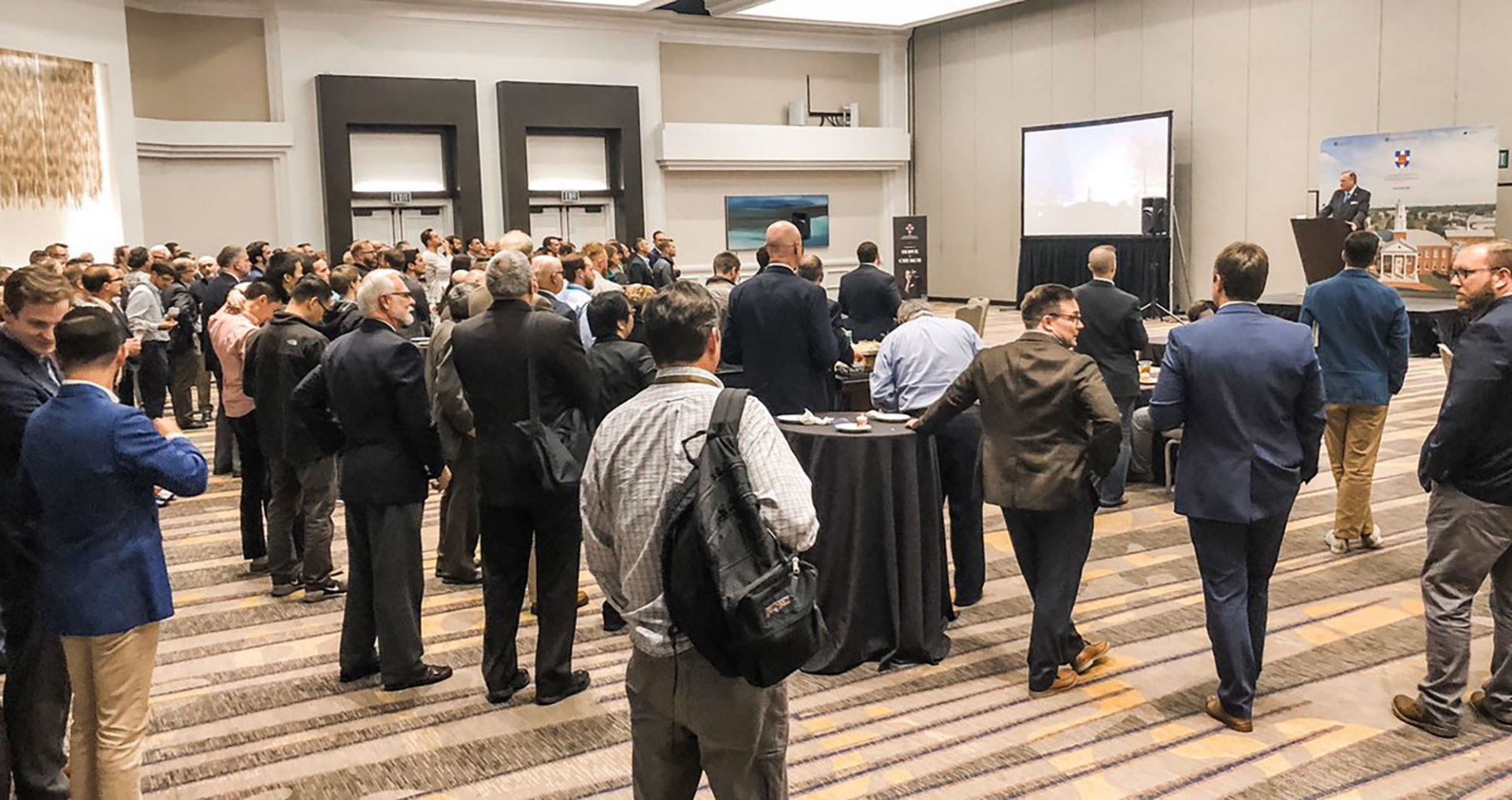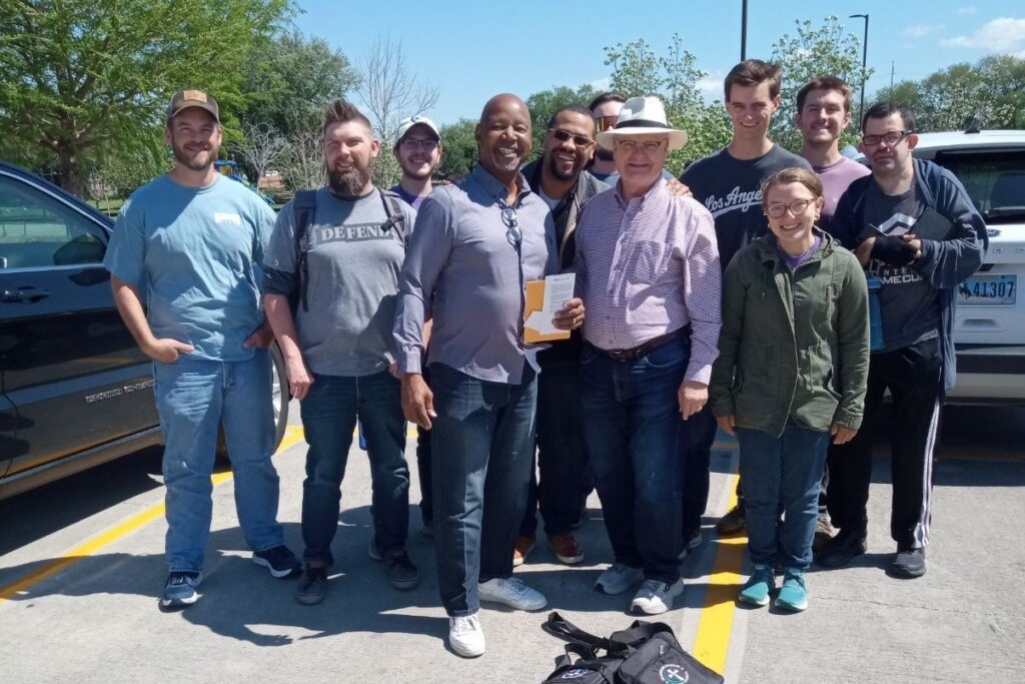
The 71st annual meeting of the Evangelical Theological Society (ETS) focused on the theme “Christ in All Scripture” and gave an opportunity for scholars to engage the whole Bible and its witness to Jesus as the heart of scriptural revelation and the Christian faith.
According to a count by Baptist Press, 193 of the presentations were given by Southern Baptist scholars. Among those in ETS leadership, R. Albert Mohler Jr., president of The Southern Baptist Theological Seminary (SBTS), served as vice president. Gregg Allison, also of SBTS, served as secretary.
Professors and doctoral students from all six Southern Baptist Convention seminaries presented papers at ETS, as well as ministry leaders and faculty from colleges that partner with Baptist state conventions. Many focused on the meeting’s theme, while others addressed other topics relevant to current biblical and theological scholarship, trends in theological education, and issues in the church.
Christ in all scripture
Stephen Wellum, professor of Christian theology at SBTS, presented one of the conference’s three plenary addresses. His presentation, titled “From Alpha to Omega: A Biblical-Theological Approach to God the Son Incarnate,” sought to answer the question of how Christ is revealed in all scripture. Wellum’s focus was to demonstrate that this issue is central to both biblical studies and systematic theology.
He asserted that “Christ is seen in all scripture as we trace out God’s redemptive plan, rooted in eternity, enacted in time and unveiled for us by God’s speech through human authors over time.” He then presented four truths grounded in the covenantal storyline of scripture and within the worldview of the Bible to illustrate how Jesus’ identity as God the Son Incarnate is revealed and unveiled in the Old Testament and brought to full light in the New Testament:
- Scripture with God as the Creator-covenant Lord. It is within this theistic understanding that we must understand who Jesus is. The coming Messiah would be human, as God promises in Genesis 3:15, but also as later revelation reveals, more than a human since He will be identified with God. This is why Christ alone can redeem us.
- Humans as image-bearers and covenant creatures. We cannot properly understand who Jesus is apart from starting with Adam as the head of the human race and the one who brings sin into the world. The deliverer promised by God must be human like Adam, but also greater than Adam to pay for our sin, destroy death and usher in a new creation.
- The nature of the human problem of sin before the holy, just Creator-covenant God. Why must the coming Messiah be more than a human? For this reason: the only one who can forgive our sin and justify us before God is God alone. God cannot overlook our sin in forgiving us; ultimately He must satisfy His own righteous demand by Himself.
- God’s salvation through His obedient Son. The Bible’s covenantal storyline, from Adam/creation to Christ, reveals that God alone must redeem us and He must do so through His Son, the greater Adam, Abraham’s true seed, the true Israel and David’s greater Son. The entire Bible is needed to understand who Jesus is, and it reveals that He is nothing less than God the Son Incarnate.
Wellum concluded that “if we approach scripture on its own terms, and within its own worldview framework, then from Genesis to Revelation, scripture teaches us that Christ Jesus is Lord.”
Assessing the modern missions movement
Jason Duesing, academic provost and associate professor of historical theology at Midwestern Baptist Theological Seminary, presented a paper titled “Who’s on First: Liele or Carey? Assessing the Implications of the Father of Modern Missions.” In it he advocated for what he calls a “symphonious approach for assessing the modern missions movement.”
Just as a symphony is composed of multiple parts working together, historical movements are made up of numerous events and people. Playing off of the popular “Who’s on First” skit by comedians Abbott and Costello, Duesing considered current discussions among historians regarding “who was the first modern missionary or who should be considered ‘The Father of Modern Missions.’”
Duesing acknowledged that it is right to refer to George Liele as the first Baptist missionary and the first American missionary, and it is also right to consider William Carey the father of modern missions as a movement, but that their contributions go far beyond titles and roles.
When we spend energy primarily on establishing these roles, we miss out on many of the people and contributions that make up the movement as a whole. Duesing argued that the symphonious approach “allows current researchers to see the full value and beauty of what the movement’s leaders were able to do in their lifetimes, not to mention all the supporting figures and trends that helped to strengthen the movement that have yet to be studied and shared.”
Theological perspective on abuse
Lilly Park, assistant professor of biblical counseling at SBTS, delivered a paper titled “A Theological Perspective on Verbal, Emotional, and Sexual Abuse.” Park argued that “Christian leaders have the ethical responsibility of responding to all claims of abuse, including invisible forms of abuse, such as verbal and emotional.” Non-physical aspects of abuse can often be minimized because of the lack of tangible evidence, she said, but leaders cannot avoid caring for those in their communities who have been mistreated in other ways. Park presented three main points:
- Leaders are like shepherds who will be held accountable to God.
- Leaders must take sin seriously as part of protecting the purity and unity of the community.
- Leaders have an ethical responsibility that is grounded in the Great Commandments to care for others.
In addressing the ethical responsibility, Park asserted, “Biblical love will not be silent when sin occurs. The best examples of leaders who intervene should be Christians. Ethical responsibility is more than doing what’s right. It’s in response to a fear of God, a high view of God’s holiness, His hatred of sin, and remembrance of God’s sacrificial love.”
“Migration” and its effect on Hispanic theological education
Miguel Echevarria, assistant professor of New Testament and Greek and director of Hispanic leadership development at Southeastern Baptist Theological Seminary, spoke as part of a session on “Global South: Raising Voices in American Evangelical Theological Education.” Echevarria discussed the importance of increasing the participation of Hispanics in American theological education, not just in specialized Spanish language programs, but also integrated into mainstream academic life.
Using the migration story of Joseph and his family in Egypt and Goshen as an illustration, he encouraged moving from a model “where outsiders do their own thing with little influence on the larger culture” to letting current initiatives be “steps towards incorporating Hispanics into the everyday life and governance of colleges and seminaries.” Echevarria also participated in a panel discussion with other scholars and an interactive conversation about practical steps moving forward.
The next ETS annual meeting will be Nov. 17-19, 2020, in Providence, R.I. The theme will be “Christianity and Islam.”
(EDITOR’S NOTE – Amy Whitfield is associate vice president for convention communications for the SBC Executive Committee.)


